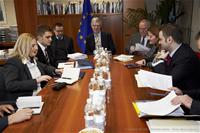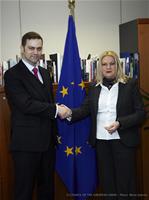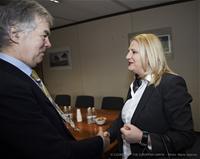A new idea for Serbia to recognise Kosovo
Evelyna Topalova, March 17, 2011
 Autonomy for northern Kosovo in exchange for recognition of Kosovo by Serbia. The proposal emerged in the latest report of the International Crisis Group (ICG), which describes in details the situation in the sensitive North. The document released on March 14th comes days after Belgrade and Pristina engaged in talks after a three-year break to discuss "technical issues".
Autonomy for northern Kosovo in exchange for recognition of Kosovo by Serbia. The proposal emerged in the latest report of the International Crisis Group (ICG), which describes in details the situation in the sensitive North. The document released on March 14th comes days after Belgrade and Pristina engaged in talks after a three-year break to discuss "technical issues".
Why the non-governmental organisation directs its attention to the North?
The reason is that the Serb-dominated area is an extremely sensitive issue in the relations between Serbia and Kosovo. Kosovo Serbs living there are still loyal to Belgrade; refuse to recognise the authority of Pristina institutions and parallel Serb structures are still present there. Northern Kosovo is also an area where smuggling and organised crime blossom which could pose security risks. This area is also the main obstacle to the reconciliation and to both countries' EU aspirations, the report reads.
"For some time, the North will remain in effect under dual sovereignty: Kosovo's and Serbia's," the document says. The ICG believes that Belgrade and Pristina should use the technical talks to consider greater autonomy for the North inside Kosovo in exchange for Serbian recognition of Kosovo independence.
The document recommends the search of flexible, temporary solutions for northern Kosovo to strengthen rule of law, solve the problem with tax collection and funding of this part of Kosovo until a comprehensive political solution is found.
The NGO reminds that international policy in the North has three aims - no use of force, no change of borders, and no frozen conflict. Each one of these principles is  important and its violation would lead to serious consequences, the report says.
important and its violation would lead to serious consequences, the report says.
As Kosovo Serbs will hardly accept Kosovo government's plan for integration, the ICG suggests authorities in Pristina to work on drafting a vision of Kosovo statehood that would be attractive for Kosovo Serbs and will be focused on their wellbeing. On the other hand, Belgrade should stop using the North and Kosovo Serbs living there to undermine Kosovo's sovereignty and should rather start accepting it is as a forum for cooperation on their path towards potential EU membership, the report says.
Pristina's reaction came immediately. Parliament Speaker Jakup Krasniqi said that ICG's suggestion for special status of northern Kosovo is not acceptable for Kosovo institutions.
A step towards finding a solution to the part of the problems accumulated for years was the launch on March 8th of a dialogue between Belgrade and Pristina on technical problems.
It was unclear until the very beginning whether the talks would start on the planned date as Pristina delegation arrived in Brussels with a delay. The Kosovo Albanians were waiting until the last minute for parliament's approval before engaging in the dialogue. However they failed to receive the expected support. The opposition opposed the launch of the talks calling them "hasty" and without clearly defined framework.
 The opposition in Serbia also criticised the government for the dialogue. The Democratic Party of Serbia of former Prime Minister Vojislav Kostunica slammed the cabinet for agreeing to engage in a dialogue with Kosovo as an equal partner. According to the party this is a step towards recognition of the breakaway Serbian province.
The opposition in Serbia also criticised the government for the dialogue. The Democratic Party of Serbia of former Prime Minister Vojislav Kostunica slammed the cabinet for agreeing to engage in a dialogue with Kosovo as an equal partner. According to the party this is a step towards recognition of the breakaway Serbian province.
The European Union in its role of a facilitator in these talks voiced satisfaction with the two-day meeting held in a "constructive and cordial atmosphere". Both sides reiterated their commitment to the dialogue and their willingness to continue the process, the statement reads.
Among the topics discussed during the first round of talks were cadastres, regional trade and free movement of goods, CEFTA agreement, telecommunications and aviation. These are all issues related to people's daily life.
Heads of Serbia's and Kosovo's delegations Borislav Stefanovic and Edita Tahiri said that some progress towards finding a solution to the problems had been registered. The next meeting of the two delegations is expected in late March.
 Bakir Izetbegovic, Andrej Plenkovic | © Council of the EU
Bakir Izetbegovic, Andrej Plenkovic | © Council of the EU Aleksandar Vucic, Recep Tayyip Erdogan | © Serbian Presidency
Aleksandar Vucic, Recep Tayyip Erdogan | © Serbian Presidency Jean-Claude Juncker, Zoran Zaev | © European Commission
Jean-Claude Juncker, Zoran Zaev | © European Commission